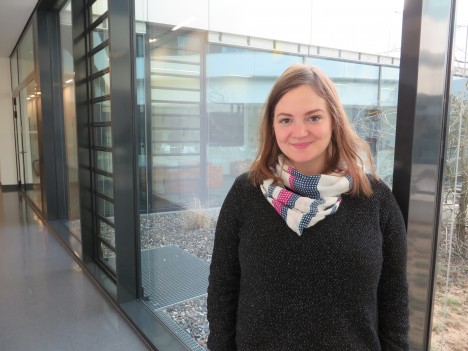Dr. Friederike Ernst didn’t have a role model for a career in natural sciences – at least not in her family. She always trusted her instinct and decided for options that sounded interesting and promised to be fun. Thus she became a truly multidisciplinary and international scientist: After studying and working in London, Berlin, New York and Stanford, the thirty year old Mildred Dresselhaus Awardee 2016 is now doing research in Hamburg on nanoscale materials, specifically on depolarization mechanisms in two-dimensional materials. On the occasion of the prize ceremony during CUI’s New Year’s reception, Friederike Ernst gave insights into her career.

Since the beginning of 2017, Dr. Friederike Ernst is doing research as a guest professor at CUI. Credit: CUI, Adler
“I did very well in trusting my instincts,” Friederike Ernst says. After having graduated from high school in Bonn, she applied on a whim to study biology in London. Biology in wet labs, however, didn’t suit her well, but Computational Neuroscience did – researching the brain. In doing so she watched how mathematicians and physicists formed brain models and decided: “I want to be able to do that as well.” She enjoyed both the process and the idea of what you could achieve using such models.
So Friederike Ernst received her diploma in physics from Humboldt University in Berlin, where she finally heard about a professor who was doing research on carbon nanostructures at the Free University of Berlin. She didn’t know much about that field but it sounded interesting, so that she got in contact with Prof. Stephanie Reich – a very enthusiastic scientist who finally offered her a position as a PhD candidate. “Actually, almost anything is interesting when you look into it,” Friederike Ernst says. She did her doctor’s degree in “a very nice group with very good results” and went to a lot of conferences. Thereby she benefitted from the contacts her professor had made teaching at the Massachusetts Institute of Technology (MIT).
Leopoldina Postdoc Fellowship
After receiving her PhD in 2013, Friederike Ernst moved to Columbia University, New York, to work on nanotubes in the groups of Prof. Tony Heinz and Prof. James Hone. In 2014 she received a three year Leopoldina Postdoc Scholarship to study two-dimensional nanostructures. When Tony Heinz and his group moved to Stanford in 2015, Friederike Ernst went along, built up the new lab together with her colleagues, and did her first accelerator based experiments.
In August 2015 she gave birth to her daughter Klara – the week before she had still been working in the lab, two weeks later she continued her research: “My husband and I could share the time with the baby. After four months we engaged a nanny and from then on we both worked full time again, meaning parental full, normal 40 hours,” she describes everyday life.
Center of life moved to Hamburg
Now the family has moved the center of life to Hamburg, Klara attends a daycare, and at the end of May a second child is expected to be born. Friederike Ernst can start immediately with her experiments on nanoscale systems in the group of Prof. Alf Mews (Universität Hamburg). “These materials come with certain states that might be of use for quantum computers for example. Therefore we want to know how these states behave, when and how fast they break,” she explains the meaning of her work. Further aims? “Well, let’s see,” Friederike Ernst says laughingly. She takes no stock in rigid career plans. Choose a direction and “just do it”. Text: Adler

